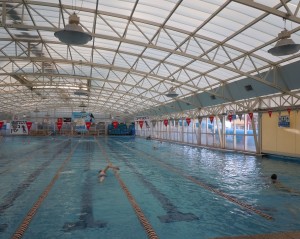 Claudia Landini is an intercultural trainer, cross-cultural and mobile career coach, interpreter, founder of Expat Clic and Expat Women at Work, a community platform for professional women living abroad. For the last 24 years she has lived in 8 countries on 4 different continents. She provides cross-cultural trainings and coaching programs in English, Italian, Spanish and French. Find out more about her at Cross Cultures Coaching
Claudia Landini is an intercultural trainer, cross-cultural and mobile career coach, interpreter, founder of Expat Clic and Expat Women at Work, a community platform for professional women living abroad. For the last 24 years she has lived in 8 countries on 4 different continents. She provides cross-cultural trainings and coaching programs in English, Italian, Spanish and French. Find out more about her at Cross Cultures Coaching
Back in 2012 I wrote a guest post for Tossing It Out about how I felt countries can be compared to swimming pools. Today, Claudia shares with us her literal experiences of swimming pools – East vs West.
I love swimming pools because, like markets and public transportation, they represent a micro world where all cultural traits and codes of a country express themselves, in an environment that forces you to relate to important themes such as nudity, bodily expressions, personal space and hygiene.
In every country where I happen to live, I immediately look for a swimming pool: both because I enjoy swimming and for the inherent interesting mosaic of cultural behaviours swimming pools entail.
In Jerusalem, as you might know, two cultures live side by side – the Israeli one, which comprises most of modern Jerusalem, and the Arab one, squashed in a smaller part of the territory. Though having more in common than they are willing to admit, both cultures organize their lives in their own distinct ways, and the atmosphere you breathe on the two sides of town is strikingly different. This is valid for swimming pools, too.
Mixed vs Female only swimming
During the first period of my life here, I swam at a pool in the West part of Jerusalem, a big and bright space attended both by Israelis and some young Palestinian boys. I then went to live in another part of town, where it is now more practical for me to swim in a pool on the East side, where the only swimmers are exclusively Palestinian and Armenian—women, of course, because in the East, mixing male and female is strictly prohibited.
Female swimming is confined to a mere forty five minutes in the morning, whereas in the West, men and women can swim together from morning to dawn, and for those who wish, there are a couple of hours per day where men or women are not allowed to mix.
To be honest, I never tried the women only swimming time in the West, since my relationship with women swimmers has proven quite complicated from the very start.
Despite the huge size of the swimming pool, they seem to be very concerned by maintaining their private space, so if you accidentally bump into them (maybe because you are swimming backstroke and are not expecting anyone to get into your way) they react vehemently, with an aggressive attitude that has got very little to do with civilly sharing a common space. In two years of swimming in the West, I rarely saw a smile or other signs of empathy: women arrive, don’t look around, they jump into the pool, swim devotedly and bark at everything that gets into their way.
In the East—despite the adverse life conditions people have been going through in the last 60 years or so—they seem not to have forgotten politeness and warmth in human interactions:
they smile willingly, greet you when you arrive, happily sacrifice a bit of their space to let you pass and say good-bye when you go. The swimming pool in the East is three times smaller than the one in the West, but I have never ever seen anyone getting angry when swimming, or reacting aggressively when someone accidentally bumps into them (which, given the size of the pool, happens often).

Social occasion
For the sake of truth, it must be said that the general attitude of women swimming in the East is a trifle less sporty than in the West. Indeed there are days when I wonder why, instead of gathering in a pool, they have not gone to a bar or to someone’s house: they get into the pool, gather in more or less consistent groups, and start chatting amiably, without moving a muscle apart from the jaw. This attitude, despite a bit surprising at the beginning, does not interfere with the aim of the place—because even if occupying a large portion of the pool, these women are always willing to move aside and give you more space if you happen to be concentrated on strokes.
Costumes worn
One might suspect that it is because of social gatherings in the pool that women get into the water mostly completely dressed, but no.
Some of them (mainly older) wear a swimsuit, others go from a burkini—a kind of women swimsuit that covers the whole body except face, hands and feet—to lovely flowered blouses and/or tight leggings. I must say that this was what struck me the most. I had thought that because of finding ourselves exclusively amongst women, the ladies would have been happy to lower the rigid cultural compliance and have their limbs breath freely for a while, but I was wrong. The sense of modesty does not abandon them, even in the locker room, where they are very wary when changing. This is another striking difference with West—who have absolutely no shame to show themselves, and sometimes even indulge mother naked in long chats with friends.
Cleanliness
As far as cleanliness is concerned, I would draw a discrete veil on both sides: water seems to be cleaner in the West, but you find all sorts of elements in it (I won’t go into details), whereas in the East, I have never seen as much as a hair, but when someone swims with particular energy, the surface gets covered with suspicious bubbles. I don’t mind though. I know that when I finish swimming, I’ll take a long hot shower. The feeling of partial cleanliness one can experience in the swimming pool is easier to shake away than that of acrimony and coldness.


It is a really interesting analysis about the East/West behaviours and cultural differences . Yes the Eastern women are not so free even in a women only context they are modest. In Dubai there are women only swimming days in Jumeirah Beach you will be surprised to notice that most of the Eastern women are fully dressed ,,, I think that it is a cultural matter and depends on the families, the countries and especially if it concerns broad -mind people or traditional minds only..
Attitudes to swimming in general is a great way to compare lifestyles in different cities and countries. The way people consider swimming a social experience, a relaxing experience or an intense cardio workout says a lot about the way we see sport and exercise in general. I have seen fights break out in pools over the difference in speed. There’s always a fast lane but “fast” is relative … and we are supposed to be working out to de-stress.